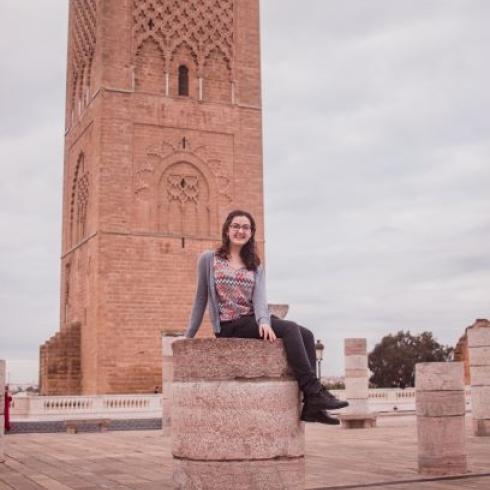The day before the holy month of Ramadan started on Monday, May 6th, was in some ways my last routine day in Rabat.
I wake up in time to eat and leave the house only slightly late (8:10) for my 8:30 class.

The streets in the medina are deserted at this time of day, the sun shades not yet hung.

I walk with my friends to the IES Abroad Center. They live with host families on the same street as my own.

Outside of the medina is the Hassan neighborhood where the IES Abroad Center is. It's more lively in the morning with commuters and café customers.

Every day starts with Modern Standard Arabic, the intro class. It's hard to believe that at the start of the semester, I didn't know a single word and couldn't read at all, and here I am writing skits in Arabic!

Halfway through class, we break for tea in the courtyard. Moroccan tea is always loaded with caffeine and sugar.

Walking back home for lunch is hot and busy. Crossing the street outside the medina is the sort of street where you have to say Bismillah ("In the name of God") before you cross, and then pray the blue taxis don't hit you!

Through the gate, Bab Mellah, the crowds continue.

The crowds clear up by Rue des Consuls, the street where artisans sell their handicrafts.
I get home and eat lunch in a hurry, sitting in the kitchen and reading while my host mom vacuums the salon. I head out again, the 20-minute walk of the morning now a sun-drenched 30-minute walk with all the crowds.

Overlooking the Bouregreg River, a stage has already been erected for the Mawazine music festival in June, when popstars from all over the world will come to perform in Rabat.

I'm going to be a bit late for my 2 p.m. class because I have to stop at the hanout, the corner store, to say hi to Younes...

And at the sweets stand to say hi to Abdorahmane and Mohammed. We always used to stop here to get these incredible fresh, sugary, five-cent donuts, but they stopped making them a few weeks before Ramadan and said no more until June.

My 2 p.m. class is Darija, Moroccan colloquial Arabic. Today our professor, Rachid, is explaining to us how the schedule of life of the whole country will change during Ramadan—three meals at night and no eating during the day, and a one-hour time shift as well!

My 4 p.m. class, Islam, is having a field trip to a theological training school. We wait outside for the bus as the afternoon traffic crawls by.

The building is rich with detailed art typical of Moroccan architecture: the zellige tiles, the painted wooden ceiling, the white plaster carvings, like stalactites.

Of course the visit includes a round of tea, poured by our Professor Khaled Saqi, and some pastries as well. This will be the last time we eat during the school day.

I walk home by the beach, the southmost one with no surfers or swimmers. In the next month, the beaches will be full in late afternoon as people sit and watch the sunset and wait for iftar, the break fast.

Every Monday night there's an open mic jam session upstairs at the Cinéma Renaissance. I've been going since the beginning of April and made friends with most of the musicians there.

The Renaissance is in a neighborhood called Centre Ville, where the train station, museum, and national bank are. It's full of wide, modern streets, and it's hard to imagine the narrow, old streets of the medina are only a few steps away.

Most of the music is either American pop, rock, or oldies, but there's also some jazz and some Moroccan pop music. Occasionally, someone will come and play gnawa, the traditional music of black Moroccans whose ancestors were slaves.

At 9 p.m., when the jam ends, a group of us wander outside to the park behind the building to spend more time hanging out and singing. Ayoub brings his guitar and we all take turns requesting songs. In this group, it's more likely to be American folk music. During Ramadan, the jam night will be at 10 p.m., after iftar, and the park singing sessions will go on until 1 a.m.

Around 10:30 p.m. my host sister texts me to come home for dinner. At this time of night the medina is pretty deserted, but that will all change during Ramadan, when the streets are most crowded between 11 p.m. and midnight as people stroll after breaking their fast. But that doesn't start until tomorrow.

Sarah Mamlet
<p>My name is Sarah, and I'm from New England but I study psychology (and math, and religion, and everything else) at Vassar College in the Hudson Valley. When I'm not doing schoolwork, you can find me singing in a choir, at ballet class, or binge watching TV shows with my friends.</p>








